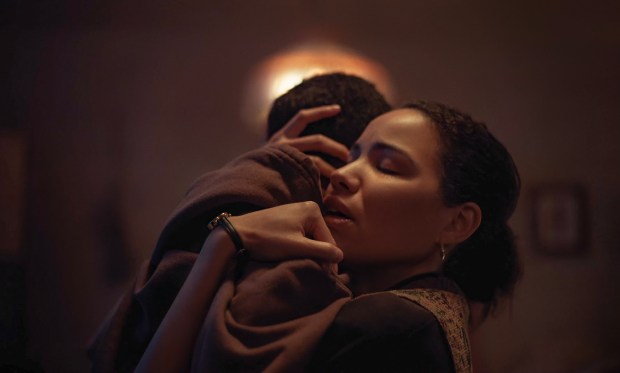Can we really trust tears as a sign of a film’s quality? A century of so many shameless, relentless cinematic mediocrities suggest the answer is no. If a movie will stop at nothing in its mission to make you cry, yes, statistically speaking, you’ll probably comply. Or not, because you feel jerked around as a viewer. But just as there are what Mike Nichols used to call “expensive laughs” in comedies — bits that get laughs, but at the expense of truth, or a scene’s pacing, or whatever — our movie history is full of weepies all up and down the quality scale.
This is one of the beautiful aspects of “We Grown Now,” the supple, vital third feature from writer-director Minhal Baig. Rather than go for the throat, its central friendship makes room for feeling, but also for listening, and watching, and reflection. You may cry or you may not. But the movie is up to far more than making sure you do.
Baig grew up in Rogers Park on Chicago’s north side, in a Pakistani Muslim household a few miles from the site of the Cabrini-Green public housing projects. The last tower was leveled in 2011. “We Grown Now” brings that place and its community back, with a tenderly observed story about two boys from Cabrini-Green learning how to say goodbye to each other when they must.
Ten-year-old Malik (Blake Cameron James) and his friend and high-rise neighbor Eric (Gian Knight Ramirez) call Cabrini-Green home, and through their eyes, every inch of cinder block, every stairwell and every beat-up old mattress feels slightly charmed, and ready for exploration. The opening scene, underscored by composer Jay Wadley’s gently insistent string-intensive music, finds the boys dragging a discarded mattress from an empty unit down the stairs to add to the pile on the asphalt outside. They need a landing pad for a jumping contest, which is really a jumping/leaping/flying contest. “Tall or small,” as James says in voiceover, “the ability to jump means all here.”
Malik lives with his sister, Amber (Avery Holliday), their mother Dolores (Jurnee Smollett) and grandmother Anita (S. Epatha Merkerson). A Mississippi transplant in the Great Migration north, Anita sees her daughter working hard and not getting much for it, though she’s looking for advancement within her company. “We Grown Now” focuses on Malik’s days and nights, mostly with Eric: navigating the projects, school, dreaming of what’s beyond the place they know.
In one scene they cut class for an adventure downtown, which takes them to the Art Institute and Union Station. As did the moneyed North Shore poseurs of “Ferris Bueller’s Day Off,” they stop for a second at the Georges Seurat painting “A Sunday on La Grande Jatte.” A second later they move on to another painting, “Train Station” by Walter Ellison. Its depiction of Black and white travelers arriving in Depression-era Chicago sparks a few words between Malik and Eric about where the Black folks in the painting have come from, where they’re going, and why the white travelers can’t carry their own luggage.
This scene is a standout; elsewhere, now and then, Baig makes some points a little too neatly, as when the boys shout “We exist! We exist!” in unison, from their high-rise balcony. Small matters, in the scheme of things. “We Grown Now” creates a fully realized visual and philosophical point of view, tied to the boys at the center. The movie may be dreamy, but it doesn’t ignore the realities of what’s happening to Cabrini-Green. The killing of 7-year-old Dantrell Davis in 1992, amid rising gang violence, leads to Chicago police disruptions, new, confining rules and regulations, late-night, legally dubious apartment searches. All this informs the story. Dolores, Malik’s mother, has every reason to worry about her son’s safety. In hushed tones, with her own mother, Smollett’s character starts thinking about getting her family out.
The now-vanished Cabrini-Green towers have been artfully recreated, with existing Chicago buildings doubling for what’s no longer here. The supple cinematography comes from Pat Scola, who lit “Pig” and the forthcoming “Sing Sing.” Smollett and Merkerson could scarcely be better; there’s not a single forced moment between them. And while you wouldn’t mind more — more about Eric’s family (Lil Rel Howery plays his patient father), or more of a dynamic emotional range outside Malik’s family — Baig takes her cue from her excellent young actors, and from the open-hearted, inquisitive spirit of Malik.
The changes happen quickly in this story of a friendship grown and tested. Baig lands on a satisfying major chord of a farewell, sad but not only that. So many goodbyes at any point along our lives are bungled, or sidestepped. Malik and Eric’s leaves them wiser, and ready, we hope, for whatever comes next.
“We Grown Now” — 3.5 stars (out of 4)
MPA rating: PG (for thematic material and language)
Running time: 1:33
How to watch: Premieres April 19 in theaters.
Michael Phillips is a Tribune critic.



